
by Regan Bervar | Jan 21, 2022 | Feature Story Bottom Left
“Politicians wanted to mine the Grand Canyon for zinc and copper, and Theodore Roosevelt said, ‘No.’” – Douglas Brinkley
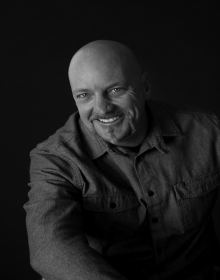 by Luke Schmaltz
by Luke Schmaltz
For the last century, the internal combustion engine has been the driving force behind the industrialized world. But, just as landlines were (mostly) replaced by cell phones, the use of fossil fuels to transport people is being systematically eclipsed by electric vehicles (EVs).
Currently, most major auto manufacturers are offering an EV model, and nearly all have announced a plan to become carbon neutral within the next two-to-three decades. The EV revolution has introduced a new type of propulsion technology into the mainstream — the lithium ion battery. Additionally, the EV marketplace is abundant — practically saturated — with dozens of startup companies looking to carve out a niche in this booming industry.
Copper is the lynchpin of the EV revolution, as it is uniquely ideal for wiring electric vehicles due to its conductivity and compatibility with high temperatures. Aluminum is the closest alternative, but in terms of cost and efficiency — it doesn’t even come close.
Meet The New Boss

Electric vehicles are set to replace gas-powered internal combustion engines.
The role of copper wire is in EVs somewhat comparable to how a fuel line feeds an internal combustion engine (ICE). The wiring network carries an electric charge from the lithium ion batteries to the vehicle’s electric traction motor. Additionally, copper wire feeds power to the rest of the vehicle’s electric infrastructure and motorized functions such as windows, lights, thermal system, etc. This results in the use of a substantial amount of copper per EV — in the batteries, the charging port, busbars, motors, rotors, and much more. According to copper alliance.org, the average EV contains 83 kg of copper — compared to the average 23 kg found in most ICEs. Thus, large-scale adoption of EVs has placed a premium on the value of copper worldwide.
A recent report published by copper.org estimates that the known copper resources across the globe are somewhere around 5.8 trillion pounds. Currently, only about 12% of this ore has been mined, processed and put into circulation — most of which is still being utilized in some capacity today. While it is true that copper has been dubbed “the world’s most reusable resource,” as demand increases, so too will the need to extract more copper from subterranean deposits.
A Worldwide Resource

The Environmental Protection Agency can insist that vehicular transportation does not encounter copper potholes.
In terms of global consumption, copper is the third most popular metal next to aluminum and steel. It is pervasive in trace amounts in every ecosystem, partially due to human activity. According to a recent report by The Dartmouth Toxic Metals Superfund Research Program, the largest deposits of copper are in the Chilean Andes, Utah, New Mexico, and the upper peninsula of Michigan, with smaller claims being mined in places such as China, Poland, Canada, Zambia, the former Soviet Union, and more. Dartmouth’s research revealed that mining copper, especially using the sulfide-ore method, can be highly toxic to the environments in proximity to mines, smelters, refineries, and other production facilities — reducing air quality while polluting lakes, streams, forests, and farmlands. High levels of copper toxicity can adversely affect the human respiratory system and gastrointestinal tract as well as the circulatory, liver, and endocrine systems. Further, high levels of toxicity from copper sulfate have been known to cause psychological distress and death from nervous disorders and kidney failure.
Support Sustainability

Copper mining can pollute the environment.
What this all boils down to is that, in an attempt to reduce pollution from burning fossil fuels, mining copper to power the cars which are supposed to deliver humanity from poisoning the earth could instead put civilization back in the slow lane. Thus, it is the onus of future consumers of EV transportation to insist that the companies who earn their business also provide transparency concerning their acquisition of the raw copper that makes EV mobility possible.
Otherwise, this 21st Century attempt at “progress” and “sustainable energy” may be nothing more than another spin on the ages old “two steps forward, one step back,” “robbing Peter to pay Paul” merry-go-round. Extracting copper from relatively accessible deposits in a responsible, regulated manner could result in less pollution, but the key to progress is to insist that car manufacturers establish a market protocol for recycling old EV batteries for the production of new ones. This standard can be further reinforced if regulatory agencies such as the EPA and the National Highway Traffic Safety Administration are pressured to establish eco-friendly regulations on copper acquisitions — primarily through recycling.
Thankfully, as “the world’s most reusable resource,” copper can be recycled fairly easily and put back into production as soon as the vehicles it helps power become inoperable. The difference between reusing copper from old batteries and purchasing newly-extracted copper is a slim margin on the profit ledger. While opting for the latter over the former will save a few pennies along the way, cutting that corner — as far as the environment is concerned — is hardly worth it.
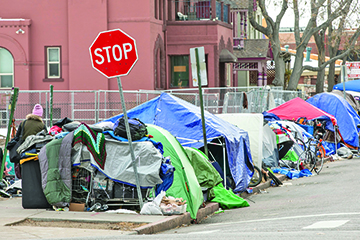
by Regan Bervar | Jan 21, 2022 | Main Articles
“The smallest of actions is always better than the noblest of intentions.” — Robin Sharma
 by Luke Schmaltz
by Luke Schmaltz
Tent-lined streets, debris-strewn sidewalks, and people languishing amidst it all — either injecting illicit drugs, relieving themselves, or walking around naked — have become unfortunate characteristics of central Denver.
According to an August 2021 report published by the Metro Denver Homeless Initiative (MDHI), 5530 individuals were unhoused or experiencing homelessness in Denver. These numbers reflect a February 2021 Point-in-Time (PIT) count, which may have fallen short of the actual numbers due to the safety issues of collecting in-person data due to Covid-19.
Of this populace, some turn to one of the numerous shelters across the greater downtown area. Others choose to “live on the street” in one of the many unsanctioned encampments in and around the city center and beyond. Yet others — perhaps the more fortunate of the destitute — have found temporary shelter in a Safe Outdoor

CVC: Colorado Village Collective is the purveyor of Safe Outdoor Spaces.
Space (SOS). The latter is a relatively novel form of addressing homelessness, and in Denver the primary administrator of such sites is known as the Colorado Village Collective (CVC).
The CVC is a Denver-based nonprofit led by ordained minister Cole Chandler, a Baylor University graduate with a Master of Divinity (M.Div.) degree. This NGO’s (non-governmental organization) boilerplate states, “Colorado Village Collaborative (CVC) exists to bridge the gap between the streets and stable housing. CVC is working to advance dignified solutions that significantly reduce Denver’s unsheltered homelessness population. Since its founding in 2017, CVC has launched five transformational housing projects, including two tiny home villages and three Safe Outdoor Spaces that have provided more than 54,815 nights of safe, dignified shelter in partnership with people coming from homelessness.”
An Honorable Pursuit
Currently, CVC maintains three Safe Outdoor Spaces. One is located on the Regis University campus in Northwest Denver, another at the Denver County Department of Human Services, 3815 Steele St., and a third, more recent site at 780 Elati in the Lincoln/ La Alma community on Denver Health and Medical Center property. This installment was pursued, in part to replace the Park Hill SOS (previously located at the United Methodist Church), and in part to offset removal of the large, unsanctioned encampment at the Four Winds American Indian Council at 5th and Bannock St. in the Baker District.
Jennifer Forker, M.Div., is the organization’s Development and Communications Director. She agrees that her organization had a busy 2021, stating, “We served nearly 300 people [last] year, a 300 percent increase over [the previous] year. We aim to serve more than 400 people in 2022. Our outcomes for 2021 include assisting 17 tiny home village residents and 47 SOS residents into more stable, permanent housing.” Forker also maintains that, “The city and the mayor have supported our emergency, temporary housing model, and we have a new contract to operate Safe Outdoor Spaces going before the City Council this month. We hope to have their support so we can carry on with our mission.”
Trouble In Paradise
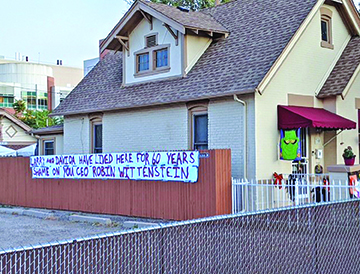
Opposed: Neighbors of the Safe Outdoor Spaces site at 780 Elati do not approve of Denver Health’s new installment.
At first glance, the CVC’s mission statement, their accomplishments, and the Denver city government’s endorsements are impressive. Yet, the SOS model is drawing scrutiny and outright criticism from residents and community leaders alike — particularly the most recent installment at 780 Elati St. The standout issues arising from the SOS model include concerns about neighborhood safety, the presence of undisclosed sexual predators, sanctioned use of illicit drugs, and inadequate solutions for citizens — people with addiction issues and mental health conditions — who require long-term comprehensive care.
Blame for the perpetuation of these concerns is aimed not only at the CVC, but even more so at Denver’s city government at large. Concerned local resident and native Coloradan Marc Spritzer sums it up succinctly, stating, “The city is, in my estimation, derelict in its duty to govern. They only enforce the laws they want to, not all the laws equally. They are not protecting citizens, including the unhoused. I would say what they are allowing them to do is even more cruel in the long run than sweeps. This is all really poor leadership — the Mayor, the City Attorney, the DA, the Judges, the city council, the State Legislators, and the Governor all have a hand in this.”
Despite this viewpoint, Britta Fisher, executive director of Denver’s Department of Housing Stability states, “Denver’s Safe Outdoor Spaces are making a difference in fostering stability, serving as a refuge to help move people from homelessness to housing. With 24-hour staffing, sanitation, support, and a myriad of services, temporary managed campsites are clearly transforming lives in our community. We are fortunate to have the Colorado Village Collaborative leading this innovative model, and the Department of Housing Stability is working to provide more support for safe outdoor spaces.”
Battlefield: Baker
Meanwhile, Dawn McNulty is a married mother of two, a longtime Baker district resident and an outspoken leader in the effort to expose and counteract the oversights of Safe Outdoor Spaces. “I personally do not see the proposed Safe Outdoor Spaces [to be] the compassionate, humane solution to Denver’s homeless problem,” she says. “In my humble opinion, it’s an interim solution that takes the pressure off the public officials.”
McNulty lives near the site of a previous unsanctioned camp at the Four Winds Tribal Council Church at 5th and Bannock. She was vocal, vigilant, and relentless in her efforts to draw attention to the hazards therein. “There was a woman with children living in a tent, and several people in the encampment openly doing illicit drugs on a daily basis,” she states. “There was vomit, human feces, urine, and needles in and around the camp, and when school at DCIS Baker (Denver Center for International Studies) started back up, I personally contacted Jolon Clark (Denver City Council) and then the Mayor’s office,” she explains. Once the camp was set to be “swept” the 780 Elati space was offered up by Denver Health to assuage the pleas for options from the Four Winds Tribal Council.
According to McNulty and other prominent community figures, the site was chosen, approved by city leaders, and the SOS build initiated with little to no engagement with the surrounding community, in spite of the fact that nearly 50 residents filed a joint appeal opposing the site. “This is when my good friend that lives in the Lincoln/La Alma community swiftly filed the appeal,” McNulty explains. “There was very little community engagement and a significant lack of transparency in the speedy process of placing the SOS site.”
Refutation Abounds
Details of this appeal are outlined in a December 6th article published by Business Den.com. In it, author Eric Heinz writes, “The 46 nearby residents claim the permit was approved outside of the authority of the zoning administrator and that the site was approved without accounting for ways to control various nuisances, such as its proximity to single-family homes, secondhand smoke, noise, outdoor lighting, littering, and pet control. They [permanent-housing residents] also have concerns about odors emitting from the portable toilets, and say that a potential homebuyer decided not to purchase in the neighborhood because of the encampment.”
Further, the La Alma/Lincoln Park RNA (Registered Neighborhood Association) released a statement on November 22, 2021, providing an in-depth expose titled “CVC Refuses to Provide Assurances to Low-Income, High-Minority Neighborhood Residents.” Here, the RNA states, “The 780 Elati site is operationally unprecedented for CVC. CVC will be operating the TSOS (Temporary Safe Outdoor Space) for the longest period of any TSOS to date. It will have the highest number of shelters. It will have the highest population of any previous site. Despite these factors and the unique characteristics of the neighborhood, CVC is unwilling to provide meaningful assurances to the neighborhood, something it has done with other neighborhoods. Therefore, the RNA reports that CVC has failed to negotiate a meaningful Good Neighbor Agreement.”
Safety Last

Homeless Camps: Encampments across the city are expanding.
Meanwhile, McNulty is quick to illustrate her growing concerns about the new SOS site in the La Alma/Lincoln Park neighborhood. “81 % of Denver voters opposed camping,” she begins. “How are Safe Outdoor Spaces any different when they allow use of illicit drugs on site?” Contrary to this, The CVC’s Jennifer Forker plainly states, “We do not allow violence or drug use in our Safe Outdoor Spaces.”
McNulty, however, provides an outright rebuttal to this, stating, “CVC Section III(O) of the Drug and Alcohol Policy in the Operational Plan for the 780 Elati encampment acknowledges there will be drug use at the site, which specifically provides for harm reduction materials available throughout the site, biohazard containers [for needles], Narcan/Naloxone, and safe use literature,” she says. “CVC allows and enables the use of illicit drugs in law abiding, tax paying, Denver citizen communities. With the certainty of mental health issues amongst this population, there is extreme opportunity for erratic, unpredictable behavior and Denver City officials are in support of this?” An exasperated McNulty continues, “Unlike prior SOS sites, CVC was unwilling to agree to Felony/Child/Violent Sex Offender resident background checks for 780 Elati Street, the Lincoln/La Alma SOS Site. Per the Colorado Sex Offender Registration Act, CVC should be required to disclose this information.”
Among McNulty’s concerns, another glaring oversight is the possibility that untrained, unqualified CVC personnel may be staffing Safe Outdoor Spaces which are occupied by people with addiction and mental health issues — since CVC claims to have personnel on site at all times. “CVC self-manages their SOS environments with 24/7 support staff, minimizing the need for police intervention,” McNulty explains. “Yet, they are unwilling to disclose incident reports to the communities [in which] they reside. This is important health and safety information for communities where the SOS sites are located, as the [SOS] residents are free to roam these communities.”
Diagnostic Prognosis

Stepping In: CVC is doing the civic duty of the Denver city government.
Currently, what it all seems to add up to is a non-governmental organization doing important civic work for the homeless which an existing and capable city government is unable or unwilling to do themselves. In the process, taxpaying, law-abiding citizens are becoming deeply concerned for the sanctity of their communities while the SOS initiative — although worthwhile — is putting but a tiny dent in the overall issue of homelessness. Ironically, it appears that just about everyone involved has, more or less, the same interest in mind: to mitigate homelessness and curtail the inhumane conditions experienced by the unhoused. The issue is pervasive and has been a forefront concern for decades. Yet, the concerns have become nuanced — and groups from one neighborhood to the next want solutions that resonate with their specific concerns. This is an instance where solidarity between HOAs, neighborhood watch groups, the Denver Police Department, SOS providers, mental health experts, and — most importantly — homeless people — could create a sustainable solution for a long-term problem.
Not to be outdone, however, the Denver Department of Housing Stability (HOST) has alas, announced their own initiative. The “Five-Year Strategic Planning Efforts” addresses all of these issues and more. The 14-point plan includes goals to “Reduce unsheltered homelessness by 50%,” “Measurably end veteran homelessness,” “Reduce the average length of time residents experience homelessness to 90 days,” and much more. Whether they can achieve these aims after grossly underperforming in this arena for decades is a subject for deep speculation. But, if you’re a betting person, it’s best to anticipate a strikeout rather than a home run.

by Regan Bervar | Dec 17, 2021 | General Featured
“You don’t build a business, you build people, then people build the business.”
 by Luke Schmaltz
by Luke Schmaltz
Just as 2020 was hijacked by Covid-19, 2021 was stifled by the Delta variant, and now it seems that 2022 is being preemptively overshadowed by Omicron.
The fear, confusion, and hysteria being whipped up in anticipation of the new variant is yet another example of how the pandemic ultramarathon is wearing down the fundamental American values of body autonomy and personal freedom.
On September 9, 2021, President Biden issued vaccine mandates for all Federal contractors, Federal employees, and Medicare- and Medicaid-funded healthcare workers. This was followed by a November 4th requirement issued by the Department of Labor’s Occupational Safety Hazard Administration (OSHA) that all companies with 100 or more workers ensure that each of their employees are either vaccinated for Covid-19 or tested on a weekly basis. Weeks later, the latter order was blocked by Federal judges in Kentucky and Louisiana — both citing the unconstitutionality of the decree.
The New Abnormal

Workers: Must retail and hospitality workers become the front-line soldiers in an underfunded war?
Should this pattern continue, regardless of blockages by Federal judges, the next logical step in this progression is a vaccine mandate for all businesses — including those that fall under the “small business” umbrella and happen to employ 48% of the entire American workforce — according to a recent report by Florida TaxWatch. Should such an Executive order be foisted on business owners and managers, perhaps after that will follow an order requiring that all persons who enter a business must show proof of vaccination. At this point, should circumstances progress to such an extreme, is when the specter of encroaching doom begins to loom over small businesses and family-owned enterprises like the shadow of a fast-approaching storm.
Unlike pandemics of the pre-Internet age, today’s vaccine hesitancy is at an unprecedented disparity with compliance. This division is fueled by everything from religious beliefs to folks citing fact-based studies on post-inoculation health issues and, of course, a litany of unfounded myths about the vaccines turning people into magnetic zombies, 5G antennas, and premature corpses.
Deja Vu
Compliance issues aside, a major underlying concern is that a small business mandate could foist the job of policing vaccine compliance onto the shoulders of Mom and Pop who are simply trying to make an honest living at the corner store. Essentially, those who serve their neighbors everyday — whether it is a meal, an oil change, a dry-cleaning order, or any one of 1,000 other services — will become the de facto enforcers of government policy on a street level, one on one basis. In a profoundly stressed labor market, this additional requirement of doing business may overwhelm some establishments, placing them in jeopardy of being shut down for failing (or refusing) to harangue every last patron for a vaccine card. Think about it: A populace of stressed-out, paranoid citizens prying into the personal matters of their neighbors at the behest of the government. Sound familiar?
Dysfunction Junction

OSHA: This agency administers rules which require compliance lettering illustration with icons for web banner, flyer
Across the Denver commercial landscape, it is universally agreed upon — among customers and proprietors alike — that all anyone really wants is for business to return to something resembling pre-pandemic normalcy. Covid-19 and its growing ranks of variants, however, do not share this outlook — and thus the current predicament. Meanwhile, the labor market limps along like an extended case of walking pneumonia as small businesses struggle to hire workers. If retail stores, contractors and every branch of the hospitality industry are scrambling to fill positions, chances are good that the government agency tasked with enforcing the speculated vaccine mandates will be understaffed as well. Over the last 18+ months, most Denver residents have seen the astonishing effects of unenforced policies. They are scattered across the sidewalks, alleyways and parking lots of the city — human casualties of a rampant, unmitigated dope epidemic.
Not In The Job Description
A vaccine mandate on the workers and patrons of small businesses could potentially decrease productivity and increase operating costs — as employees will have to shift their main concern of serving customers to first snooping into private medical histories. A secondary effect of this dynamic could be the systematic erosion of trust between the proprietors, the customers, and the workers who take care of their needs. And of course, don’t forget about the archetypical nosey-ass, Yelp-reviewing, tattletale busybodies who — with nothing better to do — will be policing the actions of workers and posting about the poor souls who have become default enforcers of government policy. Should things come to this, one might speculate that people will simply stop leaving home to do business and revert back to the unthinkable — going online to fulfill every need and giving even more money to Jeff Bezos.
The current consensus among small business owners is that they are willing to comply with mask mandates so that they can, at the very least, keep doing business. Owners, customers, and workers alike all pine for the days of yore. Yet, when presented with the speculative scenario of vaccine mandates which would have to be enforced by each business lest they be fined and possibly shut down, most respondents are, for now, staying tight-lipped. After calls to dozens of Denver restaurants, retailers and the like, a few folks willing to offer opinions were finally found.
The Bookies

Mandate: A vaccine mandate on the workers and patrons of small businesses could potentially decrease productivity and increase operating costs.
This book retailer and gift shop at 4315 E. Mississippi Ave. was recently acquired by Nicole Sullivan, owner of northwest Denver’s inimitable BookBar. Anna, perhaps the friendliest customer service person in all of Denver, answered the phone and offered a bit of relevant insight. “The mask mandate gave us more confidence to post it [the policy] on the door,” she begins. “But a vaccine mandate? I don’t even know how you would even begin to enforce that,” she explains. “I wouldn’t want to put anyone at the door checking vaccine cards. I think it’s OK for big places where people congregate a lot, but this is a store. We already went through all of that at the beginning, making sure people had masks on. Thankfully most people do.”
Staybridge Suites Hotel
While this Glendale outpost of high-end hospitality at 4220 E. Virginia Ave. is part of a worldwide conglomerate of hotels, commentary from hotel manager Max Kiker offers some valuable insights into the proposed vaccine mandate scenario. “We are a huge business, so the [current] mandate would apply to us,” he says. When asked about his managerial team’s “for or against” stance on a vaccine mandate, he continues, “Right now we are neutral. There are too many conflicting views out there, but it would impact our business because we have already lost people because of the mask mandate,” He explains. “There are enough labor issues right now and this would compound them.”
Dr. Proctor’s Bar
This Glendale neighborhood treasure at 4201 E. Mississippi Ave. is known for plenty of pool tables, great food, big screen TVs, and has been a local go-to since 1981. The daytime bartender, Susie, is quick to point out, “We are a small bar and regardless of what it [vaccine mandate] would come down to, we can’t afford to lose our liquor license, so we enforce everything. As far as the mask mandate goes,” she continues, “We are enforcing it as much as we can. Some people are compliant, and some people are just absolutely ignorant about it. If you can’t wear your mask, you gotta leave,” she explains.
Whether citizens working in retail, hospitality, and other iterations of small business have to either become spies, de facto law enforcers, or criminals by default — only time will tell. If small businesses must enforce vaccine mandates, the current state of civic division will pale in comparison to the ensuing social breakdown.
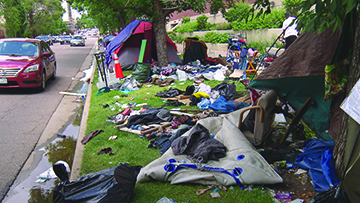
by Regan Bervar | Nov 19, 2021 | Editorials
“There’s always an easy solution to every problem — neat, plausible and wrong.”
 by Luke Schmaltz
by Luke Schmaltz
Although camping in public areas has been “illegal” in the city of Denver since 2012, the homeless presence is expanding, tent cities are widespread, and the encampments are perpetuating crime, illegal drug use, and wholesale danger to everyone in the immediate vicinity.
A 2019 attempt to overturn the urban camping ban was unanimously voted down by 83%. Yet, while the sporadic sweep of encampments continues, often it is not until a deadly situation has arisen such as with the Morey Middle School encampment last year, and the encampment at 11th and Ogden on Capitol Hill, which was recently dismantled after a gun battle within the camp finally inspired action by the Denver Police Department.
In a June 30 public statement outside a women’s homeless shelter at 4600 East 48th Avenue, Denver Mayor Michael Hancock stated, “An episode of homelessness should be no more than a brief, one-time circumstance, and we must do everything in our power to stabilize our most vulnerable neighbors,” he said. “House keys have more power to change lives than a tent.” During this speech, the mayor also announced a new housing and homeless strategy — a five-prong plan which includes purchasing motels and hotels and turning them into supportive housing, extending housing voucher programs, adding more sanctioned camping sites, increasing the availability of housing, and adding more eviction protection and rental assistance.
Multiple Culprits

Homeless In Neighborhoods: It is widely known that anyone can camp out on the streets of Denver without legal consequences.
The City of Denver is allocating more funds than ever before to deal with the homeless crisis; the solutions, however, seem to be missing the mark. Although there is some truth to the observation that homelessness is caused by an inability to afford a place to live, it is far likelier that the situation is the result of a more complex combination of circumstances.
If housing was the sole issue, then the myriad sanctioned shelters offering beds, showers and meals would be — at the very least — having somewhat of an impact on the growing problem. Yet, contrary to the expected result, the solution at hand seems to be having a reverse effect. Perhaps it is not working because it is not accurately addressing the problem. The current policy is akin to a Band-Aid on an ax wound, a cup of water on a forest fire, a moldy biscuit into the hand of a starving person in a country with no shortage of food.
You Don’t Say
Once it is accepted that the causes of homelessness run deeper than a simple lack of places to live, the discussion can continue. Among the many possibilities are four standouts which deserve consideration: Drug addiction, the lack of healthcare for the mentally ill, an experimental (and failing) approach to law enforcement policy, and a populace that is vastly divided on the imminent threat and what it means to self-police.
Just Take Two
The prescription drug boom of the early-to-mid 2010s created millions of addicts as doctors, using the tried and true “misdiagnose and overprescribe” approach, made handsome amounts of money in kickbacks from pharmaceutical companies. Finally, under intense pressure from the DEA and the public at large, the FDA began imposing tighter regulations in 2014. In the case of the near 50 million patients who were prescribed opioids in 2013 alone, this created a growing tide of addicted users of painkillers such as Demerol, Vicodin, and Oxycontin.
A June 2021 report published by drug abuse.gov cites extensive studies which link heroin use to prescription pills and their increasing unavailability. The report explains, “… almost half of all opioid deaths in the U.S. now involve a prescription opioid … Research now suggests that misuse of these medications may actually open the door to heroin use. Some also report switching to heroin because it is cheaper and easier to obtain than prescription opioids.” Someone addicted to opioids who turns to street drugs may not have both feet in the gutter, but they have definitely begun to step off thanks to the medical/pharmaceutical industrial complex.
It’s All In Your Head
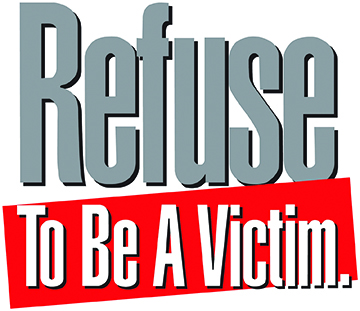
Refuse To Be A Victim: Most people living near an illegal encampment do not understand the level of potential danger they are in.
The saying “homelessness causes addiction and addiction causes homelessness” gets thrown around a lot in discussions like this, and the term “mental illness” can be substituted for “addiction” with great accuracy. It has long been acknowledged that mental instability is an underlying contributor.
In fact, a report published in July 2009, by the National Coalition for the Homeless states, “Serious mental illnesses disrupt people’s ability to carry out essential aspects of daily life, such as self-care and household management. Mental illnesses may also prevent people from forming and maintaining stable relationships or cause people to misinterpret others’ guidance and react irrationally. This often results in pushing away caregivers, family, and friends who may be the force keeping that person from becoming homeless. As a result of these factors and the stresses of living with a mental disorder, people with mental illnesses are much more likely to become homeless than the general population (Library Index, 2009). A study of people with serious mental illnesses seen by California’s public mental health system found that 15% were homeless at least once in a one-year period (Folsom et al., 2005). Patients with schizophrenia or bipolar disorder are particularly vulnerable.” Yet, nowhere in Mayor Hancock’s five-prong plan to address homelessness is there mention of mental health services.
Police Paralysis
 Intense public pressure and widespread scrutiny after the 2020 Downtown protests have forced Denver police officers and those in surrounding districts to adopt a hands-off approach to fighting crime. Police departments are having to operate in a fire department-type capacity where they respond only if a citizen calls rather than use proactive tactics such as patrol, stop, search, etc., to reduce crime. This policy has placed normally actionable crimes such as drug dealing, drug using, assault, theft, and public evacuation of one’s bodily wastes on “low priority” — sending a signal to campers that there is a new era of lawlessness afoot, it’s a free-for-all drug party and there are no consequences for committing many types of crimes.
Intense public pressure and widespread scrutiny after the 2020 Downtown protests have forced Denver police officers and those in surrounding districts to adopt a hands-off approach to fighting crime. Police departments are having to operate in a fire department-type capacity where they respond only if a citizen calls rather than use proactive tactics such as patrol, stop, search, etc., to reduce crime. This policy has placed normally actionable crimes such as drug dealing, drug using, assault, theft, and public evacuation of one’s bodily wastes on “low priority” — sending a signal to campers that there is a new era of lawlessness afoot, it’s a free-for-all drug party and there are no consequences for committing many types of crimes.
What’s more, a new group of policy influencers are at work known as The Denver Task Force to Reimagine Policing and Public Safety. This group is comprised of activists and youth ministry leaders as well as individuals from civil rights, faith-based, policy advocacy, and youth services organizations. They have put together a 53-page report of a total of 112 recommendations on how the police at large can better serve the communities in which they work. Strangely, not one of the 140+ members is a police officer or has any experience whatsoever in the business of fighting crime.
Their recommendations were recently submitted to Denver City Council, who will review and determine the next course of action. Movements such as this reinforce the message to the criminal element that more bureaucratic red tape is on the horizon, police will have to continue to “look the other way,” and the consequence-free camping, drugging, stealing, and raping party can continue indefinitely.
It Takes A Village

Opioid Addiction: A prescription for painkillers can lead to opioid addiction, to illegal drugs, and then to living on the street.
It is unfair and inaccurate to label someone as a criminal because they are homeless. As stated above, they could be suffering from addiction, mental illness, or economic hardship which resulted in them not having a place to live. Yet, it is downright ignorant and just plain stupid to think that homeless encampments do not contain a criminal element. As anyone who has had a camp pop up on their block can attest — theft, harassment, assault, muggings, and the widespread presence of hypodermic needles all increase in the area exponentially.
Yet, citizens are divided on taking a unified stance that these phenomena are bad for the neighborhood, and some go so far as to verbally attack their housed neighbors who are not in favor of the denigration of the community. What’s more, without an overt police presence, citizens must protect themselves from predators and the sad fact is that most people do not know how to fight, or even the basics of self-defense. The lack of a unified community mindset and the clear signs that most people cannot defend themselves send yet another signal to people living in illegal camps that it is ok to do as they please because nobody on the block is willing or able to do anything about it.
So, as you drive past the camps in your city, in your neighborhood and on your block and wonder why it is happening, you may want to look past the obvious conclusion of economic hardship and take a further glimpse into causal factors. Instead of blaming the homeless, blame the doctors and pharmaceutical companies, blame inherent human craziness, blame the bureaucrats, and yeah — blame yourself.

by Regan Bervar | Nov 19, 2021 | Main Articles
“They say the universe is expanding. That should help with the traffic.”
 by Luke Schmaltz
by Luke Schmaltz
Over the past two decades, Denver has undergone a high-speed growth spurt, transforming from an adolescent urban sprawl to a metropolitan powerhouse of international renown.
The spoils of rapid growth are not without consequence, however, as infrastructure scrambles to keep up with influx. One of the negative results — experienced by anyone who travels the Mile High City streets in a moving vehicle — is profound traffic congestion.
The next time you’re sitting in 3:45 p.

Echo3 electric vehicles are enclosed, designed for three adults and classified in Denver as scooters.
m. pre-rush hour traffic as your idling car burns gasoline, make note of your reaction when the inevitable hipster on an electric scooter zips past you and your stranded peers and continues along to their destination. As you languish in an automotive bottleneck, resenting the efficiency with which someone half your age goes twice your speed for a fraction of the money, consider that — just maybe — they might be onto something.
In addition to presenting a profound solution to global warming (EVs produce zero tailpipe emissions and far fewer life cycle emissions), electric vehicles may hold the key to reducing traffic jams. Sure, the hipster scooter or e-bike may not be your cup of small-batch, hand-crafted tea, but there are other options in the EV market that may shorten and simplify your daily drive time. Plus, over the long haul, EVs can most certainly save you money. Ultimately, EVs present several advantages that could, if adopted by a significant number of residents, put a dent in a traffic problem and pollution level that ranks Denver as one of the worst cities to drive and breathe in.
Sharable EVs: Bikes and Scooters
(App-guided Acquisition)
Currently, just two vendors have been authorized by Denver City Council to operate bike and scooter services across the city. Lime and Lyft were awarded contracts while other vendors — some in business locally since 2018 — have been forced to hit the road. Politics notwithstanding, the availability of these recently-dubbed “micromobility” products has been and will be critical to reducing traffic — especially for folks with errands and work commutes that are relatively close to home. Rather than fire up the ol’ gas guzzler to go to the post office down the street and back, a quick trip on a shared EV can get the job done at the same time at a fraction of the cost and with little or no stoplight migraines or parking nightmares. OK, so you might look a little silly slogging to a meeting on a souped-up kick’n’go while your fellow citizens slosh snow and mud all over your tailored suit, but there are weatherproof upgrades for determined conservationists.
In addition to being incredibly convenient, micromobility transportation creates zero carbon emissions, zero noise pollution, can be parked anywhere, and may also be offsetting the collective occupancy of RTD systems. You will never, ever sit in a traffic jam on one of these EVs. Among the down sides is that while they do not require a license to operate, you must be 16 years of age.
Echo3 EVs
(329 Santa Fe Dr., Denver, CO 80223)
In a promotional YouTube video sponso

High-end Electric Cars appeal to environmentally conscious who can’t stand to be seen on a scooter.
red by Colorado & Company/KUSA TV, Echo3 President Rex Halbeisen urges Denver residents to “reevaluate your short trip transportation.” The company delivers, designs and manufactures “the world’s most efficient electric vehicles.” Halbeisen continues with an interesting metric, “78.5% of trips you take are within three miles of your house.” This data demonstrates that three of every four times you fire up your combustion engine vehicle may be unnecessary. Instead, the errand can be accomplished in one of Echo3’s sleek, enclosed, three passenger, scooter-like vehicles. In Colorado, these EVs are classified as low-powered scooters, meaning insurance rates pale in comparison to those of a car, truck, or SUV. It doesn’t take much imagination to realize that a gridlock traffic jam situation where even a fraction of the vehicles are Echo3s is dang-near impossible.
Meanwhile, company marketing director Madeline Espinoza describes more ways in which Echo3 EVs can help reduce everyday vehicle-related headaches. “They go 35 mph, so road rage is impossible,” she begins. “They are street legal, yet you can park them on the sidewalk just like an electric scooter. The benefit of these vehicles is they are enclosed, so they can be used year-round, and I even have snow chains for them. And, if you’re in the city just trying to bop around, this is a really efficient way to do so” she explains.
While never having to shell out money for gas and carrying very affordable insurance are standout benefits, the ability to simply park on the sidewalk is reason enough by itself to entice any longtime Denverite. Espinoza also points out that an Echo3 is cheaper than an RTD pass, offers a reduced-stress driving experience and is even ideal for rural areas. “I drive mine from Littleton to our dealership on Santa Fe Drive. I just take Broadway all the way up,” she says.
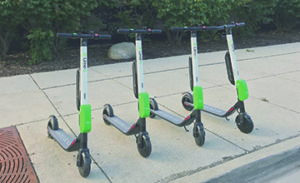
When Denver gives you these Limes, you just might get to work on time.

Echo3 demonstrates the advantage of their EVs over traditional combustion engine automobiles.
(257 Fillmore St., Denver, CO 80206)
This new line of EVs developed by Volvo and Geely was launched in 2017 from the former’s headquarters in Gothenburg, Sweden. Concerning user experience, Business Insider recently reported, “The interior is built to be something an actual human would use and enjoy — not a button-free, avant-garde exercise in alternative design. This is the all-new Polestar 2, you see, and it drives like a finished version of the [Tesla] Model 3.” The January, 2021, review also praises the Polestar 2 as “more substantive, more satisfying,” so perhaps this product may offset the propensity for road rage due to extremely satisfied and subdued drivers. At any rate, despite the potential sticker shock some buyers may experience, the company’s goals are noble. Polestar’s Head of Sustainability, Fredrika Klarén explains, “As an electric car maker, we don’t have to worry about combustion engines producing toxic emissions, but that doesn’t mean our job is done. Now we must focus all our efforts on cutting emissions in the supply chain and in the production of our cars. This is a historic and exciting time for car makers, an opportunity to seize the moment and do better. For the first time, we can dare to dream about a future with climate-neutral, circular, but still beautiful cars, and the human right of air that is cleaner to breathe.”
This contingency of the electric vehicle marketplace also includes the ubiquitous brand Tesla as well as cutting edge offerings from Hyundai, Ford, Audi, and more. These EVs are poised to offset the lasting effects of traffic congestion — global warming — while reducing America’s number one contributor to global warming pollution — motorized transportation. Although bad attitudes from sitting in three-hour traffic jams eventually dissipate, greenhouse gases trapped in the troposphere do not.




















